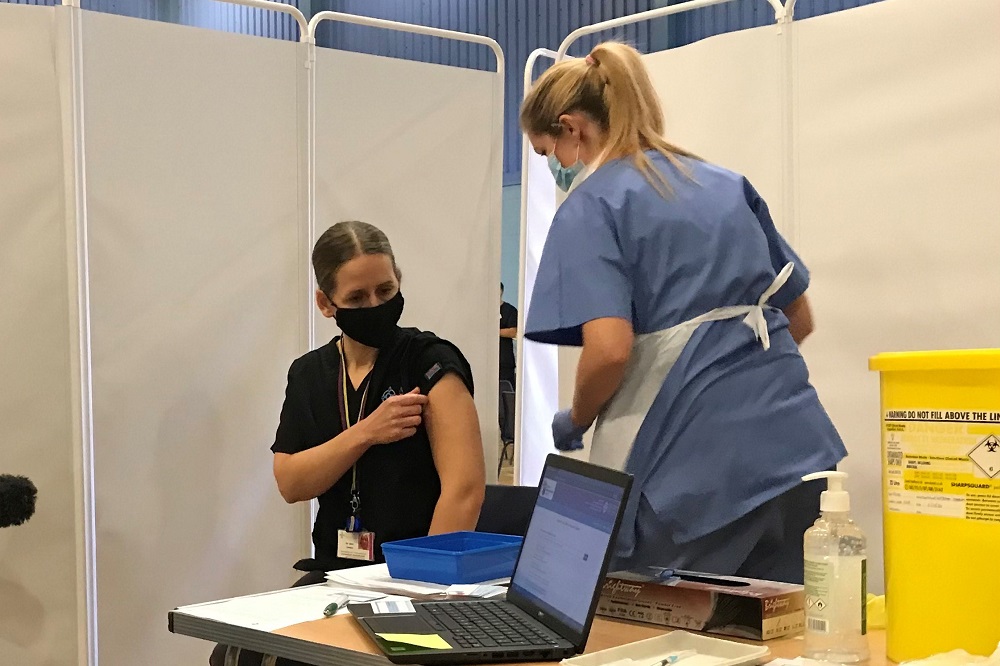Council targets increase in Covid vaccine take-up to improve workplace safety

Hannah Neary. local democracy reporter
Councillors in Neath Port Talbot have approved a new policy that will help staff to make “informed decisions” about coronavirus vaccines by providing them with impartial information and advice on booking appointments.
The council’s head of human resources Sheenagh Rees said the new policy is “very much setting out the council’s commitment to the national vaccine programme” and aims to “remove any barriers to employers attending a vaccination appointment”.
The council employs 6,995 people, many in key worker positions including social care and education.
The policy ensures staff are allowed paid time off from work to attend a vaccine appointment. They will also be paid their normal rate of pay if they are off sick with vaccine side effects and vaccine-related absences.
A report by Ms Rees states the council is legally required to reduce workplace risks, which justifies the local authority encouraging staff to get vaccinated to protect themselves and others at work.
The report states “most” council employees will “welcome” the chance to be vaccinated but “a minority” will refuse it or be reluctant to have it done. It adds the reasons for refusal/hesitancy vary, from medical exemptions to religious or spiritual beliefs.
The council’s personnel committee approved the new policy during a virtual meeting on Monday June 07. It applies to all employees, except for staff at fully delegated schools.
During the meeting, Labour councillor Sharon Freeguard asked whether the council knows how many staff have refused the vaccine. Ms Rees said the council does not have such information.
Privacy rights
Labour councillor and cabinet member for finance Carol Clement-Williams said the local authority cannot ask staff if they have been vaccinated as it would infringe their privacy rights.
The Welsh Government has not made it compulsory for people to be vaccinated against coronavirus in Wales meaning employers cannot force staff to have the vaccine.
Speaking at a press conference on Monday, Mr Drakeford said a third, booster jab and vaccines for secondary school children could take place in the autumn.
Figures show 2.18 million people in Wales (86% of the adult population), have had a first jab and nearly 1.25 million have had a second.
First Minister Mark Drakeford has pledged to offer all adults in Wales their first dose of a coronavirus vaccine by Monday June 14. The Welsh Government also said all adults will have been offered a second dose by late September.
A report by the Welsh Government revealed “non-attendance rates” increased in Wales over the past month, for reasons including transport issues, difficulty in rescheduling appointments, childcare responsibilities and lack of confidence and trust in vaccines.
The report also said groups that may have “particular difficulties” in getting vaccinated include homeless people, black, Asian and minority ethnic (BAME) groups, disabled people, asylum seekers, refugees, and single parents.
Representatives of BAME communities in Neath Port Talbot started a campaign to dispel fear, disprove myths and encourage people to get vaccinated in response to research from Public Health Wales which showed a lower uptake of Covid-19 vaccines in local BAME communities.
Medical professionals, faith and community leaders, and other local people launched the Tell Me More Campaign in March and have been sharing information from trusted sources about Covid-19 vaccines.
A report by NPT Council officers states: “Individual opinions on vaccines can vary greatly and we appreciate that having a vaccine is generally a personal choice, sometimes dictated by personal circumstances such as health or religion.
“Despite the extensive measures we have taken to ensure that our
workplace and our working arrangements are, and continue to be, Covid secure, the vaccine provides a greater level of personal safety against serious illness. Because of this, we encourage our employees to take up the opportunity to have the vaccine when it is offered to them.
“We expect our employees to be treated with dignity and respect by their colleagues in relation to their decision over the vaccine. The organisation will not accept any bullying or harassment, or other unwanted behaviour, against an employee because of their decision.”
Support our Nation today
For the price of a cup of coffee a month you can help us create an independent, not-for-profit, national news service for the people of Wales, by the people of Wales.






